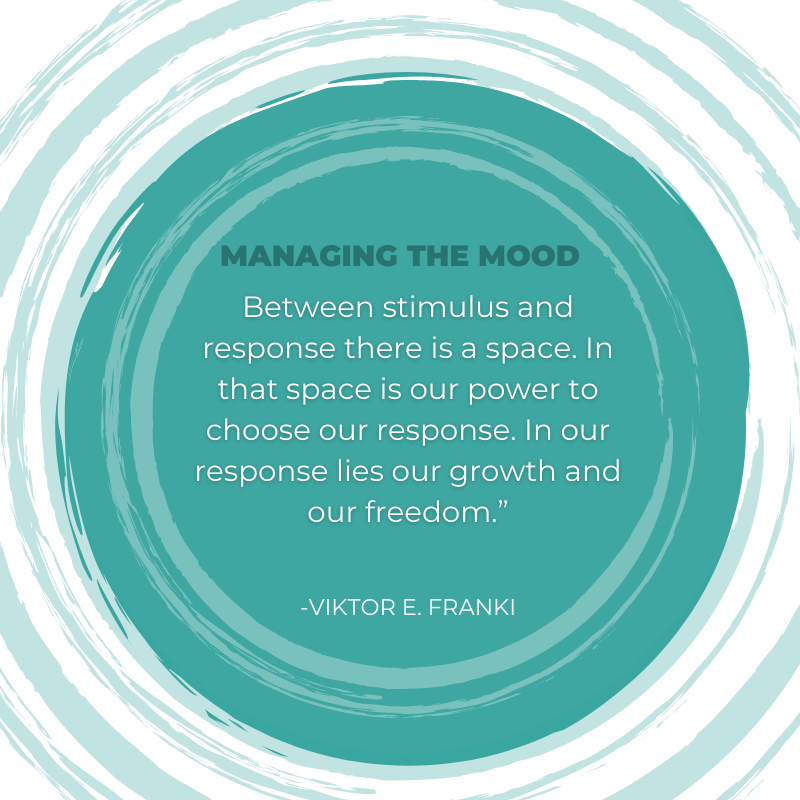Managing the Mood is up to YOU
March Madness
We wouldn’t be human without our emotions—and they always serve a purpose. Yet —at least not until recently— it hasn’t been the norm to talk about how business and our feelings mingle together as we work.
And at some point, most of us have said or heard, “it’s business - it’s not personal,” to ease the sting during difficult decisions. But, in emotionally charged situations, regardless of lip service, the sting remains, and often there’s a ripple effect that’s far reaching.
The Ripple Effect
Consider this story about Tony, a VP who manages a large corporate team. In a meeting one day, Tony loses his cool and scolds an employee in front of others, angrily criticizing her for missing a deadline. Perhaps Tony thinks he’s showing the team how important productivity is. Or perhaps he had a moment where he allowed his emotions to control him.
On the surface, it may seem like there’s minimal damage. Tony bruised one person’s feelings in the heat of the moment. But here’s the ripple effect: After the meeting, members of the team who witnessed Tony’s outburst couldn’t stop thinking about what happened. For weeks, there was gossip, tension, and a general consensus that anyone could be next. Tony’s team grew fearful of taking risks and making mistakes. They were afraid to take initiative and adjust deadlines, which had a gradual impact on quality. A year later, during a performance appraisal, Tony’s annual bonus went under scrutiny because he was leading a team who failed to improve quality and innovate outside their comfort zone.
Now let’s take a different example. Consider the effect of giving someone a compliment. When you acknowledge a person’s strengths or appreciate their efforts, you’re directing the energy in a positive way for both of you. By expressing kind words thoughtfully and sincerely, you just made someone feel great —and now you feel great. This type of energy exchange builds better communication for both of you in the future. You’ll have conversations that are more sensitive, open, and less defensive.
It starts with YOU
Amongst business thought leaders, emotional intelligence (EQ) has been a hot topic in recent years. (We happen to think it’s so important for synergy and team-building that we developed an eBook you can download for free.) It’s a set of four skills that let you manage emotions in the workplace, and every other realm of life. Some people are naturally better at it than others, but with a mindful desire to improve, anyone can practice strategies that lead to better communication, positive interactions, and stronger, more resilient relationships. Check out these ideas.
Self-Awareness
Self-awareness is a key component of EQ. People who are self-aware recognize their own emotions as they happen. It starts by paying attention to your own reactions; and thinking them through, to figure out why they’re there. Eventually (with practice) you’ll be able to identify the root of intense emotions quickly, so you can manage them on the spot, without getting bent out of shape.
Anyone who has lost their patience when their buttons are pushed (which is basically everyone) knows there’s more to self-awareness than meets the eye. It’s a lot of work to unravel our own tendencies and negative patterns, which are often deeply ingrained. For example, perhaps you tend to distract yourself with busy work instead of addressing what’s really behind a foul mood. Or maybe you grew up believing all wounds eventually heal on their own, so apologies aren’t necessary. It takes personal honesty, courage (and often discomfort) to see ourselves as we really are. Here are some practical self-awareness strategies to start.
Self-Management
Self-management is our ability to make positive, strategically aligned choices when we’re emotional. It’s the actions that we decide to take and not take — what we say aloud, and what we do. Sometimes a path of action isn’t easy to carve out when emotions are intense and our nerves are in knots. In this case, self-management is our ability to tolerate uncertainty and volatility as we explore our feelings and options.
In her book, Ignite Your Light, Jolene Hart describes the concept of negativity bias - which is our tendency to place greater significance on events and emotions that we perceive or label as negative. We react more intensely to negative events and remember them more vividly. But, self-management includes the choices that we make for our full range range of emotions, whether we’ve labeled them or not. It’s what we do when we’re feeling intensely frustrated, disappointed, provoked, fearful and defensive. And it’s also how we respond when we’re excited, happy, and confident. To make better choices in the heat of the moment, try these self-management strategies.
Download our eBook
Self-awareness and Self-Management are two core components of emotional intelligence. Emotional Intelligence is a set of four skills that let you manage emotions in the workplace, and every other realm of life. We think it’s so important for synergy and team-building that we developed an eBook you can download for free. Check out 9 Modern Skills Everyone Should be Hiring for tips on how to evaluate emotional intelligence during the screening process.
References:
Emotional Intelligence 2.0, Bradberry & Greaves: https://www.talentsmarteq.com
Ignite your Light, Jolene Hart: https://www.jolenehart.com/ignite-your-light















